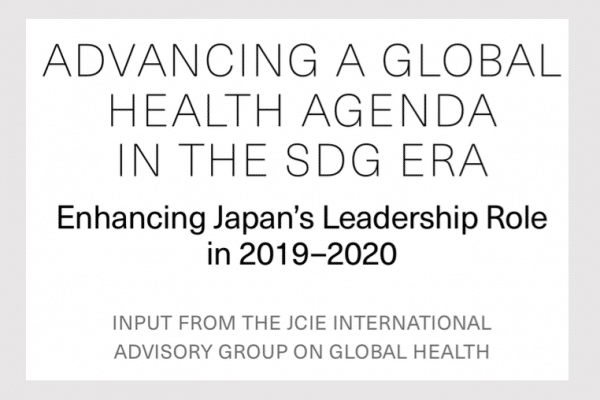In 2019 and 2020, Japan hosts a range of critical international meetings, from the G20 Summit to the 7th Tokyo International Conference on African Development (TICAD 7), and the Nutrition for Growth Summit (N4G). In order to help the Japanese government make strategic use of these events in advancing global health, in April 2018 the Japan Center for International Exchange (JCIE) convened a half-year consultative process in collaboration with five key Japanese government agencies: the Cabinet Secretariat; the Ministry of Foreign Affairs; the Ministry of Health, Labour and Welfare; the Ministry of Finance; and the Japan International Cooperation Agency (JICA). This entailed organizing an ad hoc, 15-member “JCIE International Advisory Group on Global Health (IAG).”
The IAG comprised leading global health practitioners and experts from around the world, who offered their insights into ways that Japan can leverage these events to improve global health. The process began with each member submitting written input on global health and related priorities that they felt Japan should consider as it builds its global health agenda. Then the members, along with Japanese government officials, gathered via three teleconferences to review the ideas presented. This was followed by a final roundtable in Tokyo on September 7, 2018, where the IAG members gathered along with Japanese government officials, legislators, academic experts, civil society leaders, business executives, and representatives from international organizations.
The IAG members were asked to consider two guiding questions:
- What can be done to support countries in implementing universal health coverage (UHC), taking into account the importance of its linkages to primary healthcare and health security?
- How can the overall health and welfare of societies be advanced by focusing in a holistic manner on linkages between the health sector and a range of related sectors such as water, sanitation, nutrition, and community development?
Throughout their deliberations and discussions, the IAG members generally agreed on the importance of reinforcing existing multilateral collaboration, emphasizing the core role of the World Health Organization (WHO) and the integration of universal health coverage (UHC) in the Sustainable Development Goals (SDGs). The IAG also acknowledged that national health systems should provide the full spectrum of health care and promotion services—including prevention, community-based primary health care services, critical specialty health care, and resilient systems that can respond to natural and manmade emergencies and epidemics. Finally, the IAG reiterated the importance of utilizing multistakeholder approaches—engaging with WASH (water, sanitation, and hygiene), nutrition, and urban development efforts, for example—in order to make progress in health and, especially, in health promotion.
The report includes three specific proposals on UHC:
- Establish a platform to support health financing efforts by countries moving toward UHC
- Create a regular consultative process to support communication and collaboration between ministers of health and finance
- Design an accountability framework for national commitments on UHC

